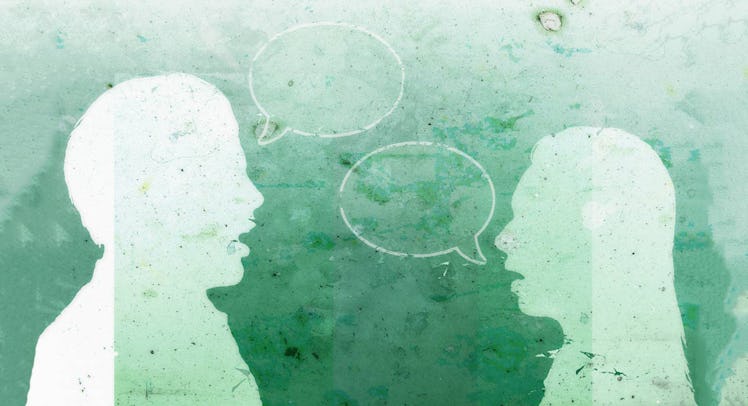The Introverted Dad’s Guide to Talking to Other Parents
Because you’re going to have to talk to a lot of other parents, whether you want to or not.

There you are, picking up your kid from preschool one afternoon when you walk around a corner and — boom! — you’re suddenly walking in-step with a parent whose name you may or may not have forgotten. Now let’s assume that you aren’t, like, a huge fan of talking to people, especially those you don’t know already. Maybe you classify yourself as an introvert. Or maybe you’ve just been doing the whole work-kids-work-sleep-repeat thing for so long that your adult social interactions are rusty. Whatever the case, this is a mighty long hallway, and you’re going to have to say something. Because you don’t want to come off as a dick – especially because no one wants to have playdates with the kid whose “dad was cold to me in the hallway.”
This is one of the things they don’t tell you about being a parent: You’re going to talk to a lot of other parents, whether you want to or not. At playdates. At birthday parties. At school pickups. In hallways. But small talk is more than just a social obligation: recent studies suggest it’s key to maintaining the social fabric of society, and may even make feel better. The good news is that with a little bit of preparation, unexpected (and/or undesired) social interactions don’t have to be annoying to people who would rather do literally anything else than chat about the weather over a slice of toddler cake on a paper plate. Or, say, walking down a freakishly long school hallway.
Break the Ice
This is the hard part. Just don’t make it weird. There are three great ways to do this, according to Jennifer Latson, author of The Boy Who Loved Too Much, which is about a child with a rare disorder that makes him an extreme extrovert. First, compliments, since secretly most people are suckers for flattery. Your best bet is complimenting them about how polite or friendly or well-spoken their child. The second is to inquire after their well-being. In this context, old standards like ‘How are you doing today?’ are fine. But more specific questions about things you have in common, like ‘Is your kid driving you nuts with playing ‘hot cross buns’ on the recorder, too?’ are better. And third: choose a conversational topic which you know will appeal. Say, for instance, the fact you both have toddlers and toddlers are strange, strange creatures. There’s bound to be one hell of a conversation starter in there.
Listen, and Ask Questions
Introverts tend to be good listeners and curious people by nature. Tap into your curiosity – and take the spotlight off yourself –by asking the other person questions. Besides, people are naturally interested in things they have going on. So find a thread that you’re interested in learning more about from this person – even if that thread is more about their kid, or information about an upcoming event. Listen to what the other person is saying; respond with something appropriate.
Be Friendly, Not Impressive
You’re trying to hit singles and maybe doubles, not go yard on every pitch. Don’t go out of your way to make the conversation – or to make yourself appear – deep or funny. No one likes, or even believes, a braggart. Just keeping a nice, casual conversation going. It means trying hard — in all the ways that these basic social interactions can be difficult for an introvert — but not trying so hard that it looks like you’re trying hard.
Just Be Yourself
More than anything, being genuine is crucial to connecting with people. So don’t put on a front or try to be into things you’re not. Your toddler can sniff out that inauthenticity, and so can other adults. Just be honest, and share something about yourself; maybe even be a little bit vulnerable doing so. If something is funny, laugh. If it’s not, don’t. If someone tells you about how their kid got bucked off a horse on vacation and broke their arm, react in horror if that horrifies you; if you think broken limbs are a rite of passage in childhood and horses weren’t meant to be tamed, then tell them that. Most importantly, relax.
Laugh at Your Screw-Ups
Introverts tend to be hard on themselves if a social interaction doesn’t go as they’d hoped, says Jennifer Granneman of Quietrev, an advocacy group for introverts. Don’t be. Remember that social interactions come with inevitable moments of embarrassment, and even if something doesn’t go as you’d hoped, think about it briefly to assess why and what you can do differently in the future, then immediately forgive yourself and move on. Besides, you’ve got shit to do.